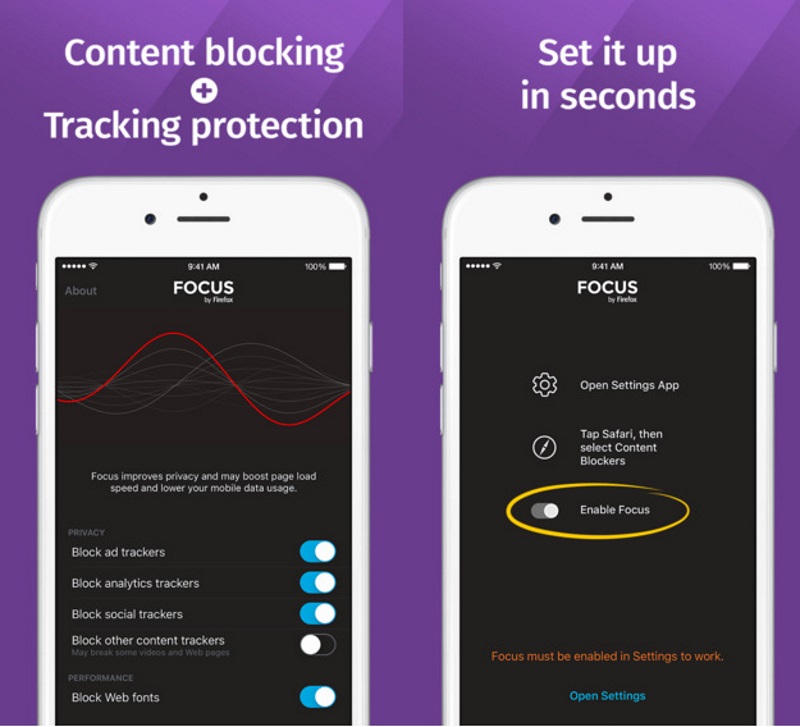Mozilla Launches Focus by Firefox Ad Blocker for iPhone, iPad

Focus by Firefox is a new content-blocking app from Mozilla that lets iPhone and iPad users selectively block advertisements and third-party website plugins that send information about you back to the site or to other companies. Launching Tuesday in the iOS app store, the software represents the latest effort to beat back the unruly rise of intrusive ads and other unwanted Internet software that often bedevils Internet users. But depending on its popularity, the app could become a double-edged sword.
Support for ad blockers has been on the rise since Apple added support for the technology in its mobile operating system this September. One chart-topping ad blocker, Peace, was ultimately pulled from Apple's mobile app store by its own developer after it got too popular. The developer questioned whether he was doing harm to an online ecosystem that largely depends on advertising for survival.
The debate over ad-blocking has thus spiraled into a much larger conversation about the future of blogs, newspapers and other online media. Ad blockers give users more control over their Internet experience, but at the risk of undermining the very sites they depend on for information and entertainment.
"We believe content blockers need to be transparent with publishers and other content providers," said Denelle Dixon-Thayer, a Mozilla exec, "rather than placing certain content in a permanent penalty box."
By basing its content blocking on a publicly viewable set of standards, Mozilla wants to give online companies better information about what will and won't trigger consumer blocking. In addition, by monitoring how Web users employ the app, Mozilla hopes to gain insights into what types of content people find most objectionable, and why.
If apps like Peace offer any guide, though, Focus by Firefox could easily transform from being a simple information-gathering tool into a mainstream piece of software that not only helps users circumvent the worst of the Web, but as a byproduct chokes off revenue to websites, particularly smaller ones. The result is a very real trade-off that affects consumers, the entrepreneur Anil Dash has argued.
In short, if your ethical argument for ad blocking is "adapt or die"? There's only die. Adaptation happens by many, many things dying.
Whoever you think is to blame for the sorry state of Web browsing, content blockers have a kind of ratcheting effect: Once you turn one on, chances are you won't see the kind of high-quality ads that might convince you to turn it off again. It also involves the risk that you'll miss whatever advertisers or publishers come up with to make the Web better again.
This isn't hypothetical. In October, a key Internet advertising trade group admitted it "messed up" the Web with its marketing technologies. The association, the Interactive Advertising Bureau, laid down a set of principles that it said would lead to less-intrusive ads.
Developments like these could be seen as complementary to Focus by Firefox's stated mission of improving the Web. But viewed in another light, they could become a source of tension as some Internet users, won over by the charm of an ad- and tracker-free Internet, choose not to go back to the world they left behind. As Mozilla put it when it laid down a series of principles to shape the debate: "Content blocking is not going away - it is now part of our online experience. But the landscape isn't well understood, making it harder to know how best to advance a healthy, open Web."
© 2015 The Washington Post
Catch the latest from the Consumer Electronics Show on Gadgets 360, at our CES 2026 hub.
Related Stories
- Samsung Galaxy Unpacked 2025
- ChatGPT
- Redmi Note 14 Pro+
- iPhone 16
- Apple Vision Pro
- Oneplus 12
- OnePlus Nord CE 3 Lite 5G
- iPhone 13
- Xiaomi 14 Pro
- Oppo Find N3
- Tecno Spark Go (2023)
- Realme V30
- Best Phones Under 25000
- Samsung Galaxy S24 Series
- Cryptocurrency
- iQoo 12
- Samsung Galaxy S24 Ultra
- Giottus
- Samsung Galaxy Z Flip 5
- Apple 'Scary Fast'
- Housefull 5
- GoPro Hero 12 Black Review
- Invincible Season 2
- JioGlass
- HD Ready TV
- Laptop Under 50000
- Smartwatch Under 10000
- Latest Mobile Phones
- Compare Phones
- Vivo Y500i
- OnePlus Turbo 6V
- OnePlus Turbo 6
- Itel Zeno 20 Max
- OPPO Reno 15 Pro Mini 5G
- Poco M8 Pro 5G
- Motorola Signature
- Vivo Y50e 5G
- Lenovo Yoga Slim 7x (2025)
- Lenovo Yoga Slim 7a
- Realme Pad 3
- OPPO Pad Air 5
- Xiaomi Watch 5
- Huawei Watch 10th Anniversary Edition
- Acerpure Nitro Z Series 100-inch QLED TV
- Samsung 43 Inch LED Ultra HD (4K) Smart TV (UA43UE81AFULXL)
- Asus ROG Ally
- Nintendo Switch Lite
- Haier 1.6 Ton 5 Star Inverter Split AC (HSU19G-MZAID5BN-INV)
- Haier 1.6 Ton 5 Star Inverter Split AC (HSU19G-MZAIM5BN-INV)

















